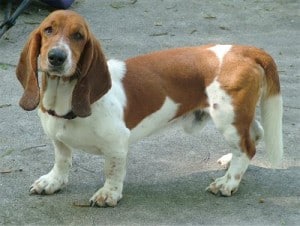From the desk of Sharda Baker.
Hi and Welcome Everyone!
This is Sharda with another Basset Hound newsletter!
Bringing home an adult Basset Hound puppy or adult has advantages and disadvantages.
While you are saved from the agony of teaching him how to adjust to your family and be “mannerly,” he might just come to you with a lot of negative baggage from his earlier home.
So, while his behaviour and expectations are set, it might prove advantageous for you, as you know quickly in your friendship that you gel with him.
Besides, you don’t have to worry about the new Basset Puppy adjusting to a new home, the problems of feeding young ones or getting him used to a family.
When choosing an adult Basset Hound, look out for obvious medical problems.
Check his skin for rash or redness, look out for discharge from the nose or eyes and be careful if he has a cough or if his ribs show up. And don’t forget to ask the breeder if he has been vaccinated.
On the other hand, raising a Basset Puppy is a lot of work – in fact, it often means making a 10- or 15-year commitment.
Beginning with cleaning up his puddles and piles to housebreaking him, it’s very difficult and is a whole load of unwelcome work. Then, he may begin to chew, and he may even chew something precious to you.
If you choose a Basset dog, he demands a lot of exercise being energetic. But the toughest part remains teaching him house etiquette.
At a kennel, don’t reach out for the most gregarious pup because this trait proves he’s domineering, while the shy one in the corner is submissive.
Either of these is a warning for you as this behaviour can work against you as the pup grows into an adult. Instead, look for a Basset puppy that’s more balanced by nature.
Bring him home when he’s between eight to 12 weeks old. This is the right time to begin socializing him when his bladder begins to be under control.
MALE OR FEMALE?
The argument of which is better can go on but each has its positive and negative sides. Here they are:
MALE THE GOOD SIDE
The male of the species is usually calm, extrovertish, and expressive in his affection, clumsy and cute. He will not experience mood swings.
MALE THE BAD SIDE
He will have ego clashes, trying to establish leadership. He may embarrass you if he licks his genitals in public. Or he may decide to lift his leg to urinate. So make sure your carpets, potted plants are all safe.
FEMALE THE GOOD SIDE
Softer and subtler, she trains faster and is not easily distracted. She is also less aggressive, and you will have less power struggles.
FEMALE THE BAD SIDE
She is usually moody.
The above pointers aside, the male of the breed, if not neutered, is likelier to roam and fight with other dogs.
Plus, he will need to be taken on a longer walk because he urinates in many spots, but unspayed females tend to get pregnant until they are spayed.
TO ‘SHOW’ OR JUST A PET?
Deciding if you want a show quality Basset dog or pet quality is the first step. If you buy a show quality pet, you’re buying one that has been specially bred to match the AKC standard.
That is the objective of a good breeding program. Animals that meet the standard are used to breed.
Breeding quality animals and non-breeding quality (some prefer these terms to the other two) ones have some very minor differences.
For instance, ‘pet quality ‘ could mean a slightly bigger animal, correct colour, and better chest.
This is a minor defect, a defect that goes unnoticed most of the time and does not really trouble the animal.
However, he will not be used to breed or be ‘shown’ at a competition since the rules state that the breed standard has to be adhered to. Faults are put down in any written breed standard. These faults would be considered when checking a puppy from a litter.
Though minor faults, they are enough to send him to non-breeding home.
Some Basset Hound breeders will tell you every one in their litter is show quality. Others are stricter.
A good Basset Hound breeder should point out the minor defects in a pup and tell you why you shouldn’t breed the pup.
A show quality Basset dog or Basset puppy should have a good temperament and should also have some kind of acting abilities.
They should love to be on stage and should also love people. These dogs also make pet quality Basset dogs.
All the best and take care.
Warmly,
Sharda Baker

